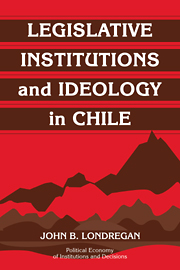Book contents
- Frontmatter
- Contents
- Acknowledgments
- Introduction
- 1 Ideology and Valence
- 2 Accident and Force
- 3 Legislative Institutions in the Constitution of 1980
- 4 Roll-Call Votes and Senate Committees
- 5 The Labor Committee
- 6 The Education Committee
- 7 The Constitution Committee
- 8 Legislative Politics and Chile's Transition Toward Democracy
- Conclusion
- A Estimating Preferences from Voting Records
- Bibliography
- Index
- Titles in the series
A - Estimating Preferences from Voting Records
Published online by Cambridge University Press: 22 October 2009
- Frontmatter
- Contents
- Acknowledgments
- Introduction
- 1 Ideology and Valence
- 2 Accident and Force
- 3 Legislative Institutions in the Constitution of 1980
- 4 Roll-Call Votes and Senate Committees
- 5 The Labor Committee
- 6 The Education Committee
- 7 The Constitution Committee
- 8 Legislative Politics and Chile's Transition Toward Democracy
- Conclusion
- A Estimating Preferences from Voting Records
- Bibliography
- Index
- Titles in the series
Summary
Obtaining an accurate measure of legislators' preferences is no mean task because of the powerful incentives politicians often have to misrepresent their objectives strategically. Thus campaign literature often emphasizes the putatively high “valence” of a candidate's character, and of the party's issue positions. In the 1990 election, candidates for the Concertación and the opposition alike were in favor of economic prosperity, high-quality education, good health care, and a clean environment, and they were opposed to poverty and civil disorder. Special interests will allege their projects represent tremendous gains in efficiency over the status quo, and denounce policies they oppose as having low valence. Similar incentives are widespread throughout the political process.
Situations that require politicians to take public positions on issues can overcome these incentives to dissimulate. This is part of the function of the press; by asking questions they set a hypothetical agenda and let political candidates and officeholders respond. However, successful politicians are masters of the rhetorical gymnastics and social acrobatics used to deflect and evade difficult questions. Another institution designed to force politicians into the open is the roll-call vote in which each legislator must register his or her vote of “yes,” “no,” or “abstain,” which becomes part of the public record. This restricted vocabulary limits the space for semantic maneuver, and so can do much to clarify a politician's position.
- Type
- Chapter
- Information
- Legislative Institutions and Ideology in Chile , pp. 247 - 262Publisher: Cambridge University PressPrint publication year: 2000

